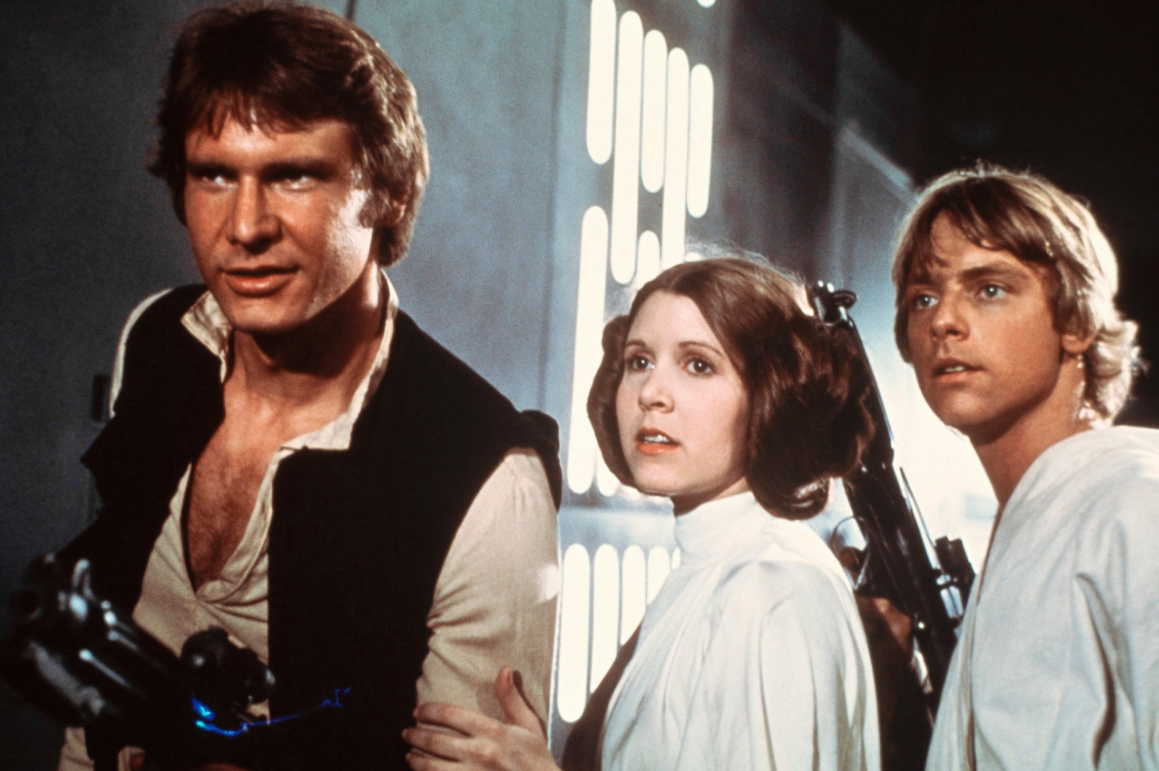
A long time ago in a galaxy far, far away, a film called Star Wars opened up in theaters and changed the world. That was May 25, 1977. It's been 40 years. Here's the raving review we ran back then, written by longtime Newsweek critic Jack Kroll.
I loved Star Wars and so will you, unless you're . . . oh well, I hope you're not. Thirty-two-year-old George Lucas, who directed American Graffiti, has made the rarest kind of movie—it's pure sweet fun all the way. I don't know how Lucas could make so buoyant and exuberant a film, without a smudge of corrupt consciousness, in these smudged times. He says it's a movie for children—what he means is that he wants to touch the child in all of us. Only the hardest of hearts won't let George do it.
Lucas doesn't waste time or get cute—he throws you right into it, just like the old Saturday serials used to. You're in the thick of things with the evil Galactic Empire and their sinister agents who are tracking down the space rebels who've stolen the secret plans to the Death Star, the super-space station whose incredible power will keep the whole galaxy in thrall unless it can be dstroyed. The Imperial forces are led by Grand Moff Tarkin (Peter Cushing) and his evil lieutenant, Lord Darth Vader (David Prowse). Against them and their legions come the rebel Princess Leia (Carrie Fisher) and some dubious warriors—Luke Skywalker (Mark Hamill), a green farmer boy with a nose for machines; Han Solo (Harrison Ford), a pilot of fortune who rents his beat-up but faster-than-light space ship to whoever can pay; and Obi-Wan Kenobi (Alec Guinness), the last of the old Jedi Knights, who were "guardians of peace and justice" before the dark eons of galactic tyranny set in.
Sound like a comic strip? It is. But the great comic strips were the fables and fairy tales of the industrial society—before television and science fiction wiped them out. Writer-director Lucas has gone back to them for his inspiration. He has the intelligent innocence to make it work, as well as perfect taste and balance, a great narrative sense and a precious gift: his imagination is fertile and it's also nice. Star Wars does what the great old comic strips like Buck Rogers, Flash Gordon and Tim Tyler's Luck did: It dissolves its heroism and villainy in an ambience of goodness. The fairy story, the comic strips and Star Wars are anti-tragedies—they tell their heroes "you don't deserve misfortune, go get the rats." It's the last chance for kids to have fun before they grow up to be Oedipus.
And we hollow-eyed Oedipuses can, if we try, go back and enjoy the fun of our pre-guilt stage. Star Wars brims with adventure, charm and marvels. It ranges from star-strewn space to arid planets to the intricate, menacing complexity of the giant Death Star. The movie teems with monsters and mutations, including two robot buddies on our side—C-3PO, a gold-encased humanoid with an endearingly prissy English accent, and R2-D2, a kind of blue-collar robot shaped like Yogi Berra, who speaks in an eloquent blend of Tarzan's chimp and Long John Silver's parrot. There's a funny, deftly satiric scene in a saloon whose clientele are the scum of a thousand earths—every grotesquerie that protoplasm can assume.
The performances are delightful—Lucas wants no part of camp and finds the nerve center of sincerity in the comic-book style. His three heroes have beautifully amusing comic-strip faces—Mark Hamill the sky-eyed, determined innocent; Harrison Ford the tough but noble rapscallion. Carrie Fisher is adorable with her big, clean spunky features and her great figure, which is the very embodiment of the friendly voluptuousness we all remember in girls like Buck Roger's Wilma, Flash Gordon's Dale and Mandrake the Magician's Princess Narda.
Related: Star Wars: The Phantom Menace
This friendliness is the key emotion in this clean, clever, entertaining movie by a gifted and developing artist. It's a feeling that crackles in the sensational special effects—the detailed miniatures, the interstellar flights, the blazing space battles and a hand-to-hand duel with sabers whose blades seem to be beams of light. The army of credits for this serious and delightful labor implies a creative community that stands for the benign side of technology. Star Wars is a hell of a lot of fun and Lucas makes fun a sparkling pop metaphor for the sheer joy of goodness that could even make friends out of men, mutations and machines. Is there fun in our future?
This article originally appeared in the May 30, 1977 issue of Newsweek.
Uncommon Knowledge
Newsweek is committed to challenging conventional wisdom and finding connections in the search for common ground.
Newsweek is committed to challenging conventional wisdom and finding connections in the search for common ground.
About the writer
To read how Newsweek uses AI as a newsroom tool, Click here.








